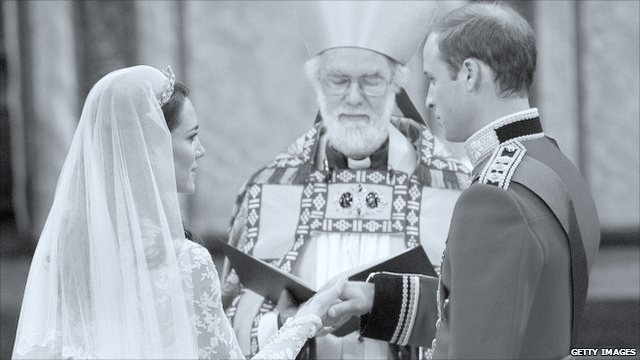By: Cornelia Powell – Confluence Daily is your daily news source for women in the know.
The bride’s entrance into the majesty of St. Paul’s was announced by a fanfare from trumpeters high inside the cathedral’s celebrated dome. Perhaps they were not only announcing a princess bride, but prophetically heralding in, for better or worse, a new era. Thirty-seven years ago, Lady Diana Spencer’s charismatic appeal as a bride, combined with the grand splendor of the British monarchy, revived the “great white wedding”—helped along with society’s need for order and tradition, a little Reaganomics, plus a dash of glam and glitter!
Or as author Maria McBride-Mellinger described changes following the royal wedding in 1981: “After more than a decade of swinging singles and disco infernos, suddenly everyone wanted to be married and every bride wanted a gown fit for a queen: regal and ornate, with a lengthy train, and a jeweled veil. The big white wedding was back in style and no expense seemed too great.”
Signaling another change of the times (something more archetypal, affecting the archaic structure of relationships), the bride and groom made royal history that day with a break in tradition even before becoming husband and wife. Removing some outdated words from the Church of England’s 1662 version of the Book of Common Prayer, as the couple stood before the archbishop of Canterbury, and witnessed by nearly a million-fold television audience, the bride’s marriage vows did not include the promise “to obey.”
A London byline in The Washington Post a few days before the wedding reported that the archbishop of Canterbury revealed “the decision to drop this vow was made very quickly in his discussion of the service with Charles and Diana and that he told them, the usual clergyman’s joke. ‘It’s a bad thing to start your marriage off with a downright lie.’ He told reporters that many couples now omit the vow, which was a remnant from the Middle Ages, when a wife would pledge ‘to be bonny and buxom in bed and board.’”
I don’t doubt the archbishop’s knowledge of history regarding marriage vows including “to love, cherish and obey.” However, my understanding of the Latin meaning of the word “obey” as used in the old marriage text is “to hear, to deeply listen”—a promise that would be beneficial, even essential, to any successful marriage, yes? If that’s the case, my only complaint with the original marriage vows is that the pledge “to obey” (i.e., “to listen”) was in the woman’s declaration but not in the man’s. Is the promise “to love and cherish” truly possible without “deep listening”?
The gift of giving someone your focused attention, the gift of “deep listening,” is most precious. Perhaps because such a connection was so painfully missing in Charles and Diana’s relationship, they instilled in their sons a sixth sense about finding, cherishing and protecting love and harmony. We saw this intimacy of connection during the marriage vows of their first son Prince William and Kate Middleton—“their chemistry lit up the screen,” as Tina Brown wrote in Newsweek following their wedding. “Everything about her actions, to and for William, is about creating a feeling of safe continuity: You know me. I am here.” We’ve seen this soulful closeness continue in their marriage and now in the relationship of second son Prince Harry and Meghan Markle, kindred spirits who found each other although from vastly different backgrounds.
I look forward to the upcoming royal wedding, the marriage ceremony of Harry and Meghan—not just for the “glam and glitter,” but especially to be present to the intimate recognition of the other, the deep listening of love in action, and the “set the world on fire” changes possible when wedding vows are made inside a spiritual partnership like both of these modern-day princes and their beloveds have created. All of life, then, becomes an awakening to “love and cherish.”
Certain wedding “traditions”—royal or otherwise—are indeed outdated and need tossing aside; others are keepers in their own right. Then there are those traditions that simply need the wisdom of a woman’s touch! ~
[In part, excerpted from “The End of the Fairy-Tale Bride: For Better or Worse, How Princess Diana Rescued the Great White Wedding” available on Amazon. www.CorneliaPowell.com]
[Cornelia is working on a new book, A Memory of Beauty: The Spiritual Mission of a Princess—which explores the transformational nature of kindness. www.CorneliaPowell.com]
Also read:
Why Royal Weddings Matter – Part 1, “The Real Fairy Tale”
Why Royal Weddings Matter Part 2, “The Scent of Love”
Why Royal Weddings Matter Part 3, “Victoria’s Choice”
Why Royal Weddings Matter Part 4, “Channel Kindness”
Why Royal Weddings Matter Part 5, “The Whiter Shade of Pale”
Why Royal Weddings Matter Part 6, “Wedding Vows”
Why Royal Weddings Matter Part 7, “Royal Wedding Redux”
Why Royal Weddings Matter Part 8, “The Language of Flowers”
Why Royal Weddings Matter Part 9, “What the Veil Reveals”
Why Royal Weddings Matter Part 10, “Tokens of Abundance”
Why Royal Weddings Matter Part 11, “The Honey Month”
Cornelia Powell
Wedding Folklorist, Fashion Historian, Author & Guest Speaker
Confluence Daily is the one place where everything comes together. The one-stop for daily news for women.


